
Fauci Rushes to Help Woman Who Suddenly Collapsed at Elite DC Dinner
-
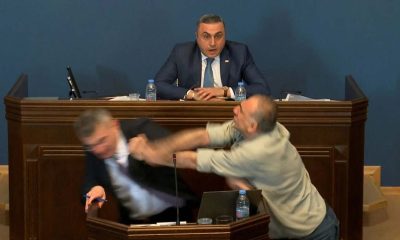

WATCH: Georgia Parliament Descends Into Chaos as Lawmakers Throw Punches Over Bill
-


Sydney Rocked by Second Stabbing in Days as Priest and Worshippers Targeted at Church
-


Trans High School Runner Finishes 2nd Among Girls, Would Have Finished Near the Bottom of Boys Division
-


Caitlin Clark Roasts Woke Comedian on “SNL” During Surprise Appearance
Former Covid czar Dr Anthony Fauci came to the rescue of a woman who collapsed during a glamorous black tie dinner in Washington DC on Saturday night, according to witnesses.
Chandler Dean, a speechwriter, said the former White House chief medical adviser was the nearest doctor available when someone fell down and struck their head during a reception at the Gridiron Club.
“Last night at the Gridiron Dinner in DC, maybe 10 feet from me and [colleague] Sarah Gruen, a woman collapsed, hit her head on a table, and was laying on the floor without moving,” said Mr Dean on Twitter on Sunday.
“People [were] gather trying to help, but no one is sure what to do. Someone goes to find a doctor. They found one.” Mr Dean attached a photo showing Mr Fauci in formal wear, apparently in the act of rising from or returning to his chair.
Ms Gruen corroborated Mr Fauci’s intervention, as did Politico’s daily diary column ‘Playbook’, which said the woman had fainted elsewhere in the hotel and was not a guest.
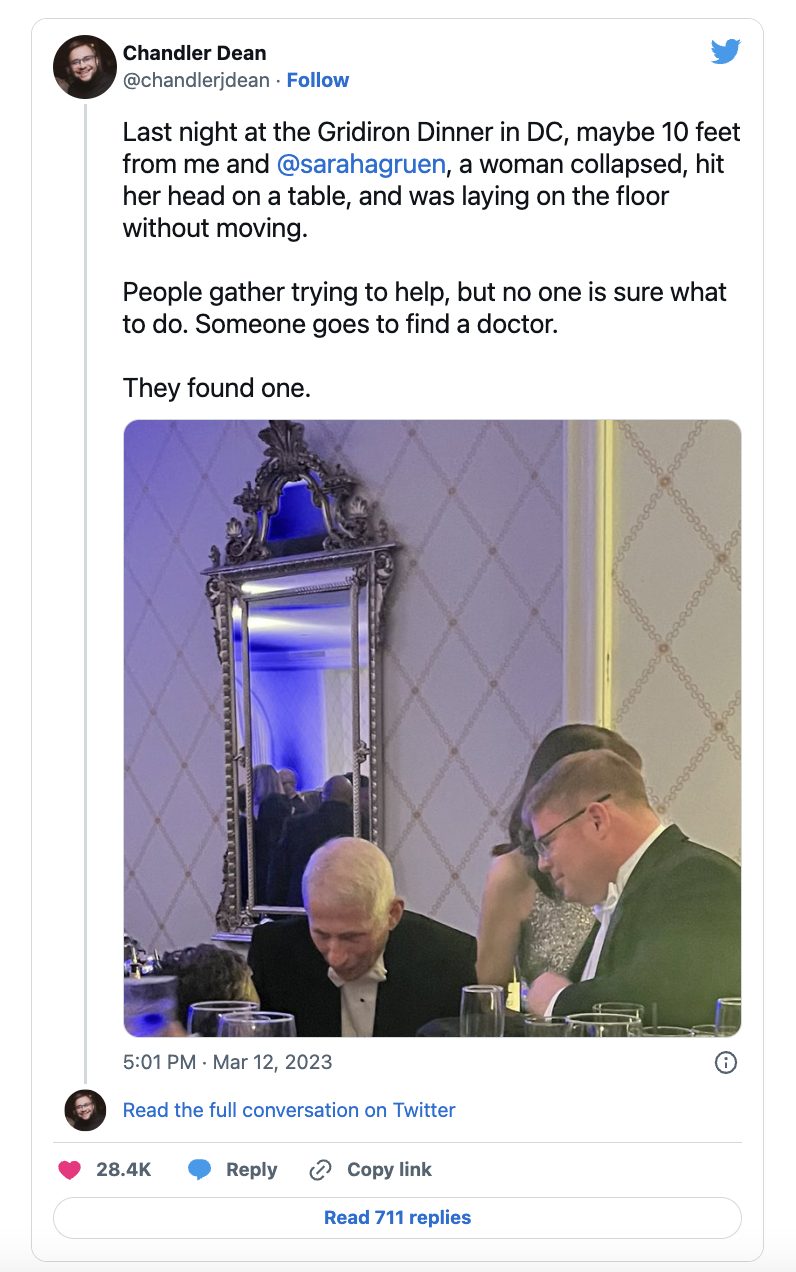
“Thankfully, she was okay,” said fellow speechwriter Eric Schnure. “And the good doctor posed for a photo with her, documenting one of the best ‘only in Washington; stories of all time!”
The Gridiron Club is a 138-year-old journalists’ association whose annual dinner is among the most prestigious events in the Beltway calendar, usually featuring speeches from the serving president and other politicians.
Mr Fauci stepped down from his government positions on 31 December last year, ending a historic 38-year span as the director of the US National Institute of Allergy and Infectious Diseases (NIAID).
Having counselled every US president since Ronald Reagan and led the federal government’s response to the AIDS crisis, and the Covid-19 pandemic as an adviser and spokesperson to both Mr Trump and Joe Biden.

News
Ex-TikTok Employee Speaks Out: I Was Ordered to Send US Data to China
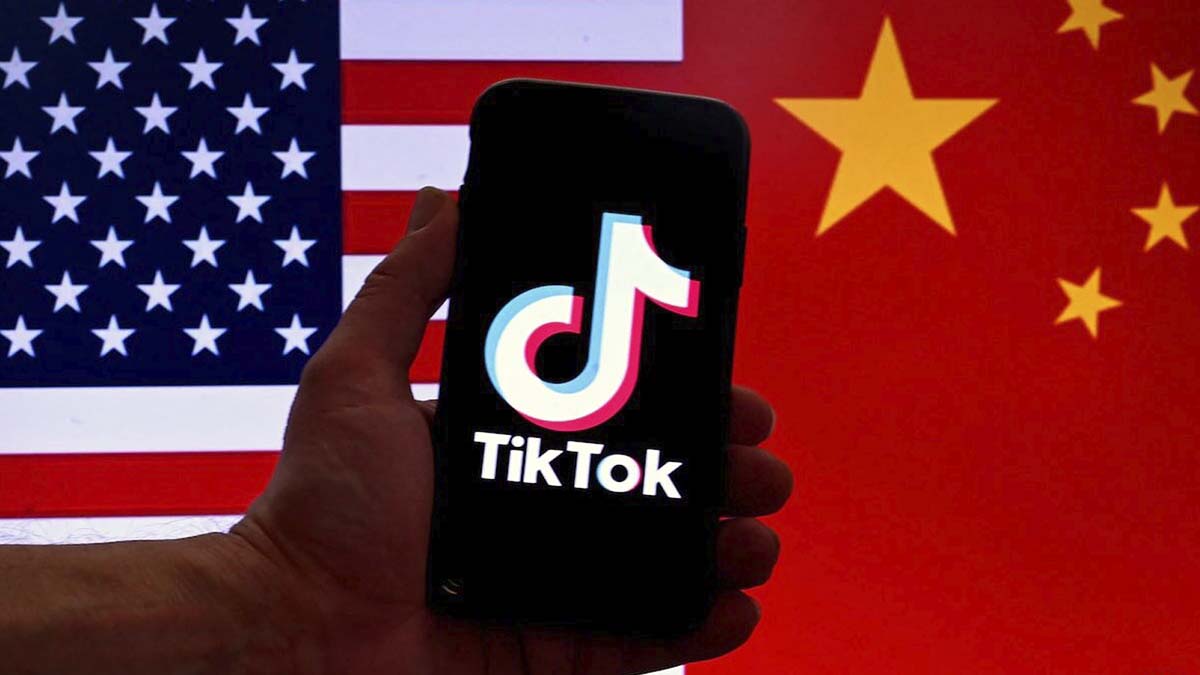
A former senior employee at TikTok said he was ordered to send American user data to Beijing-based parent company ByteDance, contradicting TikTok’s public claims of operating independently from China, according to a Fortune report published Monday.
Evan Turner, a senior data scientist for TikTok from April to September in 2022, told Fortune that every two weeks TikTok had him email spreadsheets containing millions of American users’ data to ByteDance employees in Beijing, including the users’ names, email addresses, IP addresses, and demographics.
Turner said he “literally worked on a project that gave U.S. data to China” even though TikTok had launched Project Texas in March 2022, promising U.S. officials that it would stop sharing American user data with its Chinese parent company and keep the data in U.S.-based data centers.
“There were Americans that were working in upper management that were completely complicit in this,” Turner said.
The former senior data scientist said that while his supervisor was switched from a ByteDance executive in Beijing to an American manager in Seattle, a human resources representative told him he would in reality still report to the Beijing-based ByteDance executive.
Turner said he never met with the American manager and continued to have weekly meetings with the ByteDance executive.
“Even though a spreadsheet is probably a very tiny percentage of all of the information that TikTok collects, it can be extremely targeted and very damaging to certain people,” Anton Dahbura, executive director of the Johns Hopkins Information Security Institute, told Fortune.
“Everyone should be really concerned.”
U.S. lawmakers in January grilled TikTok CEO Shou Zi Chew over his company’s alleged ties to the Chinese Communist Party, after both President Joe Biden and former president Donald Trump voiced national security concerns and tried to restrict the video-sharing platform’s operations in the United States.
Last month, the House voted 352-65 in favor of banning TikTok unless it is sold to a non-Chinese company.
Biden said he would sign the bill should it pass through the Senate.
News
Speaker Johnson Unveils Plan for Ukraine, Israel at Closed-Door GOP Meeting
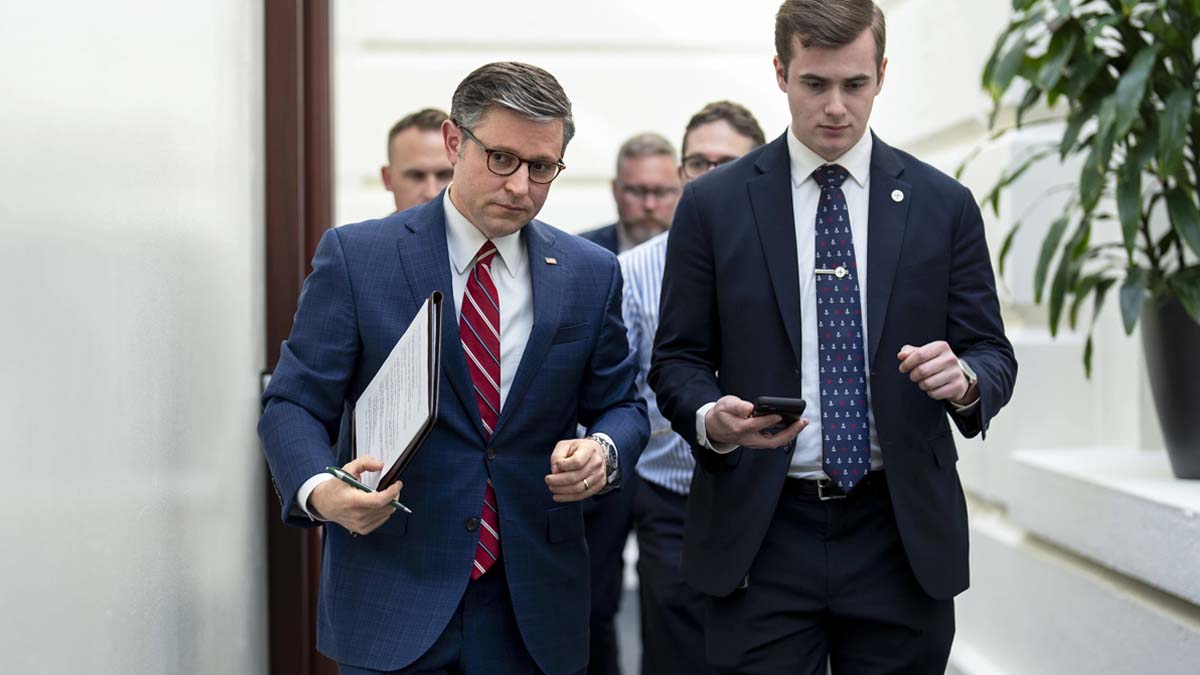
Speaker Mike Johnson (R-La.) has unveiled an outline of his plan to move foreign aid through the House, pitching four separate bills to address aid for Ukraine, Israel, Taiwan and other national security priorities that he says will all get votes before the end of the week.
The strategy sparked an immediate backlash from some conservative lawmakers who have demanded that any additional Ukraine aid be accompanied by tougher security on the U.S.-Mexico border — proposals excluded from Johnson’s legislative blueprint — raising questions about the viability of the Speaker’s plans.
“A lot of conservatives are very upset about how this is going down,” said Rep. Marjorie Taylor Greene (R-Ga.). “He’s literally broken his promise.”
Johnson rolled out his proposal during a closed-door House GOP conference meeting in the Capitol basement on Monday, after months of delaying any decisions on a politically prickly topic that’s splintered his party and threatened his gavel.
The plan is first to move a procedural rule governing all four bills — Ukraine, Israel and Taiwan each get their own, with the fourth focusing on national security priorities. Each proposal would then be voted on separately, in contrast to the Senate’s $95 billion foreign aid legislation that combined the various elements into a single package.
The fourth national security-related bill, according to Johnson, will include a proposal to help pay for Ukraine aid by seizing Russian assets; a plan to provide some of the aid in the form of loans; and new sanctions on Iran in the wake of Tehran’s weekend strikes on Israel.
Another GOP lawmaker said it would also include a TikTok ban and convertible loans for humanitarian relief.
Johnson’s piecemeal strategy offers the unique advantage of allowing lawmakers the opportunity to pick and choose which pieces of the Senate bill they’d like to support and which ones to oppose. To sweeten the deal further, he’s allowing for amendments to be offered on each proposal.
“My phone melted over the weekend, with all the members letting me know all of their ideas,” Johnson told reporters after the closed-door meeting. “There was a consensus that was recognized, in my view, from all the opinions that were shared, and that is that it really was the will of my colleagues to vote on these measures independently and not have them all sandwiched together as the Senate had done.”
Johnson said the text of the bills would be released “sometime early” on Tuesday, and he would adhere to a House rule allowing lawmakers 72 hours to examine the bills before they’re asked to vote on them — a timeline that would keep the House in Washington at least until Friday, which is a day later than is scheduled.
Still, the plan remains very much in flux, and there are plenty of questions swirling around the legislation, including how far the House proposals will stray from the Senate’s top-line spending numbers and whether the four bills would be sent to the upper chamber separately, or recombined and delivered as a single package.
Another key wild card is how Democrats will react to Johnson’s proposal. Democrats in both chambers have been adamant that they want to see the House take up the Senate-passed supplemental, a position House Minority Leader Hakeem Jeffries (D-N.Y.) re-upped as recently as Monday morning.
Some top Democrats, while still waiting to see the details of the bills, expressed early reservations about Johnson’s strategy, not least because it means additional aid for Ukraine’s beleaguered forces will be delayed while both chambers are in recess next week.
“They haven’t come up with [legislation] yet, and we don’t have time. We don’t. So I’m highly skeptical,” said Rep. Adam Smith (Wash.), senior Democrat on the Armed Services Committee. “Ukraine’s on life support, and it’s like they’re getting ready to pull the plug here. Not even so much pulling the plug. They’re tripping over the plug. It’s not even necessarily intentional, it’s just not understanding the seriousness of the situation and the importance of the timing.”
The Republican reaction to Johnson’s foreign aid gambit was a mixed bag on Monday, with some hard-line conservatives lauding his decision to detach the priorities into separate bills and including an open amendment process, while also railing on the exclusion of border security.
“I do like the fact that Johnson separated them,” Rep. Eli Crane (R-Ariz.) said after departing the closed-door GOP conference meeting, before calling the omission of border security “horrible.”
“The border should be the priority,” he added. “How many times did you hear leadership and other Republicans saying hey, this is the hill we’re gonna die on, right. And now it’s just gone. So I don’t like that.”
Rep. Bob Good (R-Va.), the chairman of the House Freedom Caucus, echoed that sentiment, lauding the separation of the priorities and the plan for an amendment process while criticizing the lack of border security.
“The American people are gonna be very disappointed if we don’t require border security in order to fund Ukraine, because we have basically said we were going to do that for the last six months,” he said.
During Monday’s GOP meeting, Rep. Matt Gaetz (R-Fla.) urged Republican leaders to hold onto the foreign aid bills — even if they pass this week — before sending them to the Senate to pressure Democratic leaders in the upper chamber to adopt the House-passed border reforms that Johnson excluded from the foreign aid debate.
“We should not send over any aid to any other countries until the Senate takes up HR-2,” Gaetz said afterward, referring a GOP border bill passed through the House last year.
Other Republicans joined in the criticism, including Greene, who has threatened to force a vote on ousting Johnson over Ukraine aid.
Speaking to reporters after the conference meeting, Greene said, “I am firmly against the plan as it stands right now,” but did not reveal any details on when — or if — she plans to trigger her resolution to remove Johnson.
“I haven’t decided on that yet,” she said, but argued that Johnson is “definitely not going to be Speaker next Congress if we’re lucky enough to have the majority.”
Asked if he will be Speaker for the rest of this Congress, Greene responded: “That is to be determined, like I said, I’m still processing what I heard in there.”
And some kept their cards close to their chests, not revealing where they stand as they process the proposal and wait to parse through particulars.
“We’ll see,” Rep. Chip Roy (R-Texas) told reporters when asked for his thoughts on the plan.
News
4 Big Moments from First Day of Trump’s “Hush Money” Trial
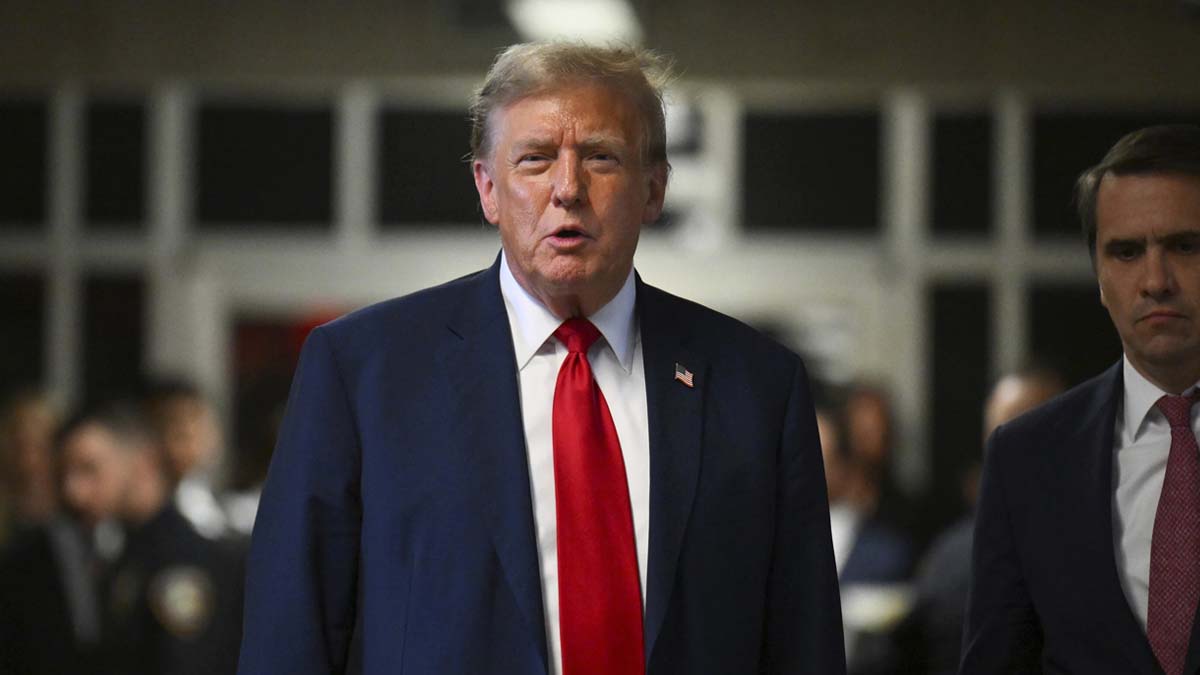
Donald Trump appeared inside Manhattan Criminal Court on Monday as the first criminal trial against him began with jury selection.
No jurors were selected from the dozens screened.
It marked the first time a former president has gone to trial over criminal charges — which stem from six-figure hush-money payments the ex-president allegedly made to former porn star Stormy Daniels and Playboy Playmate Karen McDougal ahead of the 2016 election.
Trump has pleaded not guilty to 34 felony counts of falsifying business records in an effort to cover up the payments to keep Daniels and McDougal quiet about alleged affairs the women say they had with him.
The trial is expected to last about two months, and Trump faces up to four years in prison if convicted.
Because it’s a criminal trial, the former commander-in-chief must show up at court every day that it’s in session.
Here’s the 4 big moments Trump’s ‘Hush Money’ Trial:
1. It emerged that Trump may have to skip his son Barron’s high school graduation ceremony next month because of the trial. His lawyers asked the judge not to hold the trial on Friday, May 17 so the ex-president can attend the graduation in Florida. The judge did not immediately rule.
2. Melania Trump, Donald Trump Jr., Eric Trump, Rudy Giuliani and former top Trump aides Hope Hicks and Kellyanne Conway are among the names jurors will hear during the trial, the judge said.
3. Prosecutor Joshua Steinglass recited Trump’s infamous “Access Hollywood” hot mic moment Monday morning, saying Trump’s “grab ’em by the p—y” speech word for word. The judge ruled that the tape could not be played for jurors, but testimony about the tape will be allowed in.
4. The DA’s office urged Merchan to fine Trump $3,000 for violating the court’s gag order by disparaging likely witnesses Michael Cohen and Stormy Daniels in social media posts. Merchan set a hearing in the matter for next week.
News
Supreme Court Allows Idaho to Ban Trans Surgeries for Minors

The Supreme Court ruled Monday to allow an Idaho law protecting children from life-altering transgender procedures to go into effect while the law is challenged in lower courts.
The law, passed last year, bans procedures like double mastectomies on girls who identify as boys and giving children puberty blockers and cross-sex hormones, which have been linked to bone development issues and heart problems.
The law also stipulates that doctors who perform transgender procedures on kids could go to prison for 10 years. The decision means the law will go into effect for the state except for two families who say their children identify as transgender who sued with the help of the ACLU claiming the law was discriminatory.
Justices Neil Gorsuch, Samuel Alito, Clarence Thomas, Brett Kavanaugh, and Amy Coney Barrett all sided with Idaho Attorney General Raúl Labrador who appealed to the court to turn back a sweeping injunction placed on the law by a federal judge who completely blocked the law. Justices Ketanji Brown Jackson, Sonia Sotomayor, and Elena Kagan all dissented.
Gorsuch said that Judge B. Lynn Winmill, who blocked Idaho’s law back in December, went too far in her decision.
“Ordinarily, injunctions like these may go no further than necessary to provide interim relief to the parties,” he wrote. “In this case, however, the district court went much further, prohibiting a State from enforcing any aspect of its duly enacted law against anyone.”
The ruling was the first time for the Supreme Court to weigh in on a state law shielding children from life-altering transgender procedures. Labrador celebrated the ruling, saying it was a major win for children in his state. Litigation will continue and the Supreme Court will likely hear the case on its merits at some point after the appeals process.
“I’ve witnessed firsthand the devastating consequences of drugs and procedures used on children with gender dysphoria. And it’s a preventable tragedy,” Labrador said. “The state has a duty to protect and support all children, and that’s why I’m proud to defend Idaho’s law that ensures children are not subjected to these life-altering drugs and procedures.”
“Those suffering from gender dysphoria deserve love, support, and medical care rooted in biological reality,” he added. “Denying the basic truth that boys and girls are biologically different hurts our kids. No one has the right to harm children, and I’m grateful that we, as the state, have the power — and duty — to protect them.”
Labrador’s appeal to the Supreme Court was backed by 19 Republican attorneys general, who argued that it would be a “devastating medical scandal” if Idaho was not allowed to protect children from transgender procedures.
In recent years, over 20 states have enacted laws shielding children from transgender surgeries, puberty blockers, and cross-sex hormone regimens.
News
Bidens Report Nearly $620K in Income, Harris and Her Husband Report More Than $450K
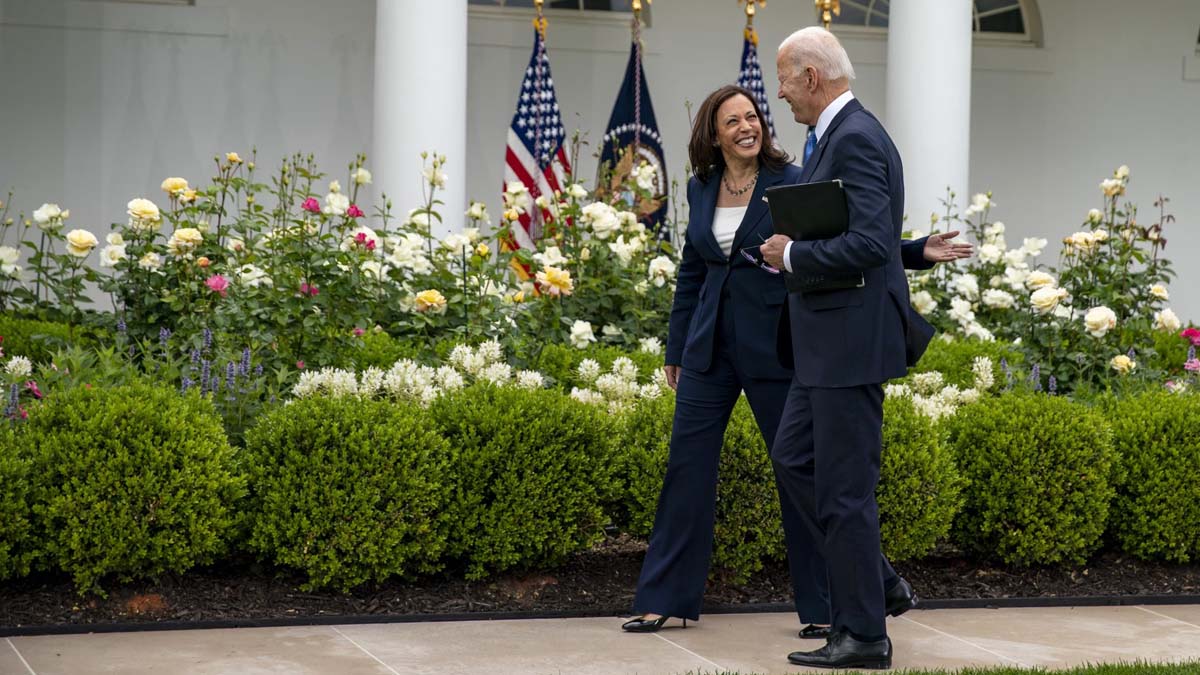
President Biden and first lady Jill Biden made a combined income of $619,976 last year, and Vice President Harris and her husband made $450,299, according to the couples’ 2023 tax returns the White House released Monday.
The president and his wife paid an effective federal income tax rate of 23.7 percent, the documents showed, and paid a total of $146,629 in federal income tax.
The annual salary of a president is $400,000, and Jill Biden works as a professor at Northern Virginia Community College, from which she made $85,985.
“Once again demonstrating his commitment to being transparent with the American people, President Biden has released the most tax returns of any commander-in-chief while in office,” according to the White House, which added that Biden has shared a total of 26 years of tax returns.
The president and first lady paid $181,086 in combined federal, Delaware, and Virginia income taxes. In addition to their federal income tax, they reported paying $30,908 in Delaware income tax, and the first lady paid $3,549 in Virginia income tax as a result of her job in the commonwealth.
The Bidens donated $20,477 across 17 charities, with one of the largest contributions being a $5,000 gift to Beau Biden Foundation, which is the same amount they gave to the charity over the past two years. The foundation, named after the president’s late son, focuses on protecting children from the threat of abuse.
They also donated $5,000 to the Women’s Wellness Space. The couple also gives to St. Joseph on the Brandywine, their parish in Wilmington, Del.; to the Tragedy Assistance Program for Survivors and the National Fraternal Order of Police Foundation.
Harris and her husband, Doug Emhoff, had a combined income of $450,299 in 2023, according to their tax returns released Monday. The documents show the second couple paid an effective federal income tax rate of 19.7 percent and paid $88,570 in federal income tax.
The couple paid $15,167 in California income tax and Emhoff paid $11,599 in District of Columbia income tax for his work teaching at Georgetown University, where he was paid $174,994 in 2023.
They contributed $23,026 to charity in 2023, including $5,000 to Howard University, where Harris went to college, and $5,000 to California State University Northridge, where Emhoff went to college.
Additionally, they gave $5,000 to the University of Southern California, where Emhoff went to law school, and $2,500 DC Central Kitchen, a community kitchen in Washington.
In 2022, the Bidens made a combined income of $579,514 and paid an effective federal income tax of 23.8 percent. In 2021, the Bidens earned $610,702 with an effective federal income tax rate of 24.6 percent before taking office.
Harris and Emhoff in 2022 had a combined income of $456,918, paid an effective federal income tax rate of 20.5 percent and paid $93,570 in federal income tax.
In 2021, the second couple had a combined income of $1,655,563 and paid an effective federal income tax rate of 31.6 percent. At the time, Emhoff earned $582,543 for his work as a lawyer at the law firms DLA Piper and Venable, which he left early in 2021 when Harris was sworn in as vice president.
News
CNN Ends Charles Barkley, Gayle King Talk Show

Charles Barkley and Gayle King’s weekly talk show on CNN has come to an end after just six months.
The basketball Hall-of-Famer and longtime journalist fronted a weekly call-in show named ‘King Charles’ that only launched in November but struggled to pick up viewers.
When the show was announced at the end of 2023, CNN confirmed it would only ‘run through the early spring’.
Airing at 10pm ET on Wednesday nights, data worryingly showed it was behind reruns of both ‘Friends’ and ‘South Park’ in the viewership figures.
Data from Nielsen also shows the former NBA MVP and longtime journalist’s show had the lowest-rated prime time weeknight series debut in CNN over the last 10 years.
According to the New York Post, a source said the show was impacted by Barkley’s schedule. He was only available for filming on Wednesdays because of his other commitments as an NBA analyst.
Since premiering in November, ‘King Charles’ saw its audience plummet by around 20 per cent. Its first episode brought in 500,000 viewers.
The 14 episodes that aired brought in an average viewership of 459,000, according to data provided by Nielsen.
A CNN spokesperson said: ‘King Charles has come to the end of its limited run as we announced when it launched last fall and was a great addition to CNN’s lineup, with the youngest, most affluent, and most diverse P2+ audience in its cable news time period.
Barkley told DailyMail.com in March 2023 that he only considered the offer to work with King because he has ‘so much love and respect for’ her.
‘I’m not looking to get on TV anymore,’ Barkley told DailyMail.com on the Manhattan streets.
‘I just got so much love and respect for Gayle. She’s the only reason I’m even considering it.’
In October 2022, Barkley signed a new 10-year deal worth well over $100million with TNT to host ‘Inside the NBA’ after he flirted with the idea of joining Saudi-backed LIV Golf.
News
Trump Media Closes Down More Than 18% After Filing Plans to Issue More DJT Stock
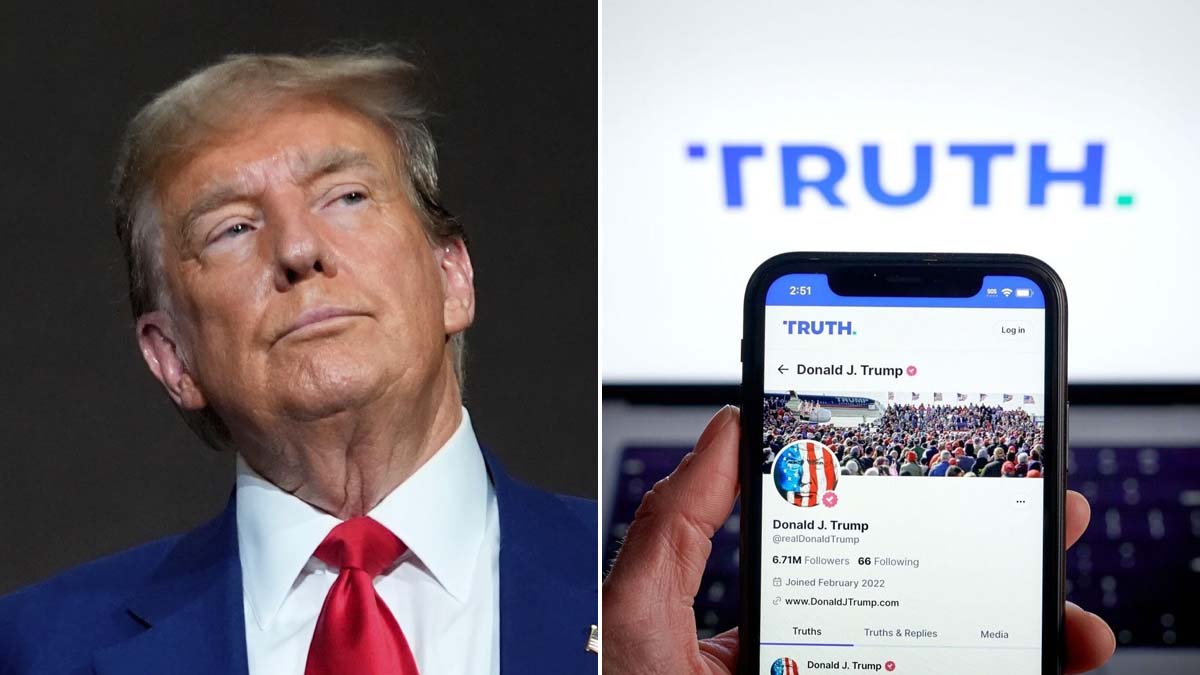
Trump Media and Technology Group, the company that owns Truth Social, announced the issuance of 21.5 million new shares on Monday, causing the market to sell off many of its shares en masse as the stock dropped over 15%.
Former President Donald Trump, the majority share owner of TMTG, lost about $470 million in net worth after Monday’s drop, per CNN, but on paper, he has lost billions because the stock soared once it first went public.
The decline started on April 2, when the stock traded at $51.60. It has since nearly halved its value.
The new stock issuance will devalue Trump’s and others’ shares in the company but will allow the company to raise more cash right now.
Matthew Tuttle, CEO of Tuttle Capital Management, said the company would be “stupid” not to sell more stock, even amid the stock plunge.
TMTG will not be able to sell those new stocks immediately because they will have to jump through other hoops, including a six-month waiting period, in order to get the move finalized.
Trump and Trump Media & Technology Group Corp has hit a new low pic.twitter.com/qS8oZ5HiyG
— Jeff Storobinsky (@jeffstorobinsky) April 15, 2024
Trump’s stock shot as high as $71.93 on March 27 as investors celebrated the company’s merger with Digital World Acquisition Corp., a “blank-check company” or type of business that raises cash to find other companies to merge with.
Trump Media and Technology Group has long been considered overvalued due to its lack of revenue. The company brought in about $750,000 in the last quarter of 2023, paling in comparison to Meta’s $40 billion earnings in the same period. TMTG brought in $4.1 million in 2023 and lost nearly $58.2 million.
Fox News host Maria Bartiromo recently questioned TMTG CEO Devin Nunes, a former House Republican from California, on the company’s market downturn.
“If you actually look at the cost, we built Truth Social … for a fraction of what many of these Big Tech dinosaur companies were built for,” Nunes said.
“So even if you take the ridiculous cost that it took us to get to this point, we are well positioned because we have no debt,” he added. “We’re coming out of this with no debt, a platform that works really, really well that communicates to millions of people. And then we have $200 million in the bank.”
News
WATCH: Georgia Parliament Descends Into Chaos as Lawmakers Throw Punches Over Bill
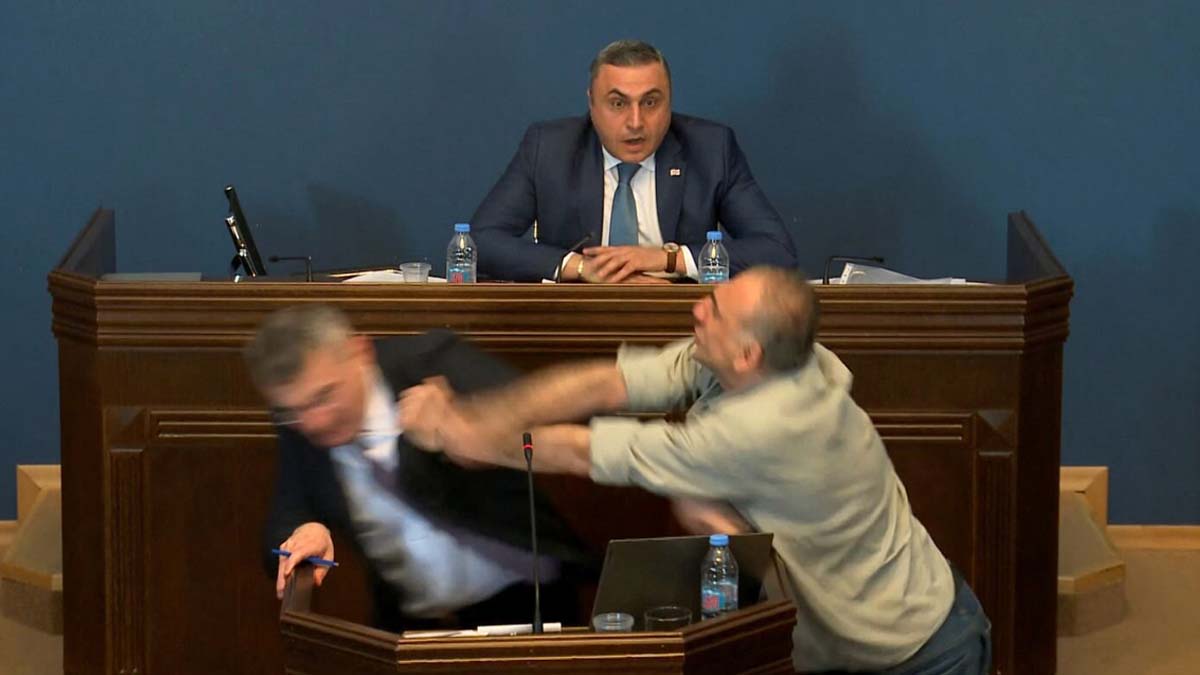
Georgia’s parliament descended into chaos Monday after the leader of the ruling Georgian Dream party’s parliamentary faction was punched in the face while discussing a controversial law on “foreign agents.”
Video shows Mamuka Mdinaradze, 45, punched in the face by opposition MP Aleko Elisashvili, 46, while addressing the chamber.
Mdinaradze, who is a driving force behind the legislation, can be seen toppling over as several other MPs join the melee. Footage shows lawmakers on opposing sides leaping up from their desks and trading punches. Protesters later greeted Elisashvili with cheers outside the parliament building.
The “foreign agents” bill is controversial within Georgia and has been criticized by countries as a “Putin-style” import from Russia. A draft submitted last week calls for media and non-commercial organizations to register as being under foreign influence if they receive more than 20% of their budget from abroad.
The measure is nearly identical to a proposal that the governing Georgian Dream party was pressured to withdraw a year ago after large street protests.
The Georgian Dream party has insisted the law is necessary to combat what it derides as “pseudo-liberal values” imposed by foreigners, and to promote transparency. Georgian critics have labeled the bill as the “Russian law,” likening it to the Kremlin’s efforts to crack down on dissidents.
Opponents have also argued that the law would complicate Georgia’s aim of joining the European Union, which issued the country long-desired candidate status last year.
The Georgian Dream party, has said it wants Georgia to join the EU and NATO, yet it is seen as deepening ties with Russia.
The EU, meanwhile, has said that the “foreign agent” law is incompatible with the block’s values.
“Creating and maintaining an enabling environment for civil society organizations and ensuring media freedom is at the core of democracy. It is also crucial for the EU accession process,” Peter Stano, spokesman for the EU’s foreign-policy arm, said last week.
Monday’s brawl came as Georgian Prime Minister Irakli Kobakhidze held a meeting with ambassadors from the EU, the U.K., and the U.S., to discuss the legislation.
President Salome Zourabichvili would veto the law if it is passed by parliament, said her parliamentary representative Girogi Mskhiladze. But that veto might not be long-lasting. Zourabichvili’s term ends this year and under constitution changes the next president will be named by an electoral college that includes all members of parliament.
Watch:
WATCH: Chaos erupts in Georgia parliament as the MP from one party attacks the MP from another. Mamuka Mdinaradze was giving a speech on controversial legislation when he was attacked by an opposing member.
The bill is being called “The Russian Bill” because it’s similar to… pic.twitter.com/9P7zwUTJ9k
— 🇺🇸Travis🇺🇸 (@Travis_in_Flint) April 15, 2024
News
Sydney Rocked by Second Stabbing in Days as Priest and Worshippers Targeted at Church

A Christian leader and several worshippers have been stabbed multiple times during a church service in Sydney, with the attack broadcast live on YouTube.
The alleged perpetrator, a 15-year-old, was arrested and taken to an undisclosed location by police as an angry crowd gathered outside the church.
It comes just two days since a man armed with a knife murdered six people in a Bondi mall.
The incident at Wakeley’s Assyrian Christ The Good Shepherd Church occurred at 7.10pm last night, according to New South Wales Police.
The service was being live streamed on the church’s YouTube page.
Graphic video of the incident showed a man dressed in a black hoodie approaching the Bishop and stabbing him multiple times in the head, neck and back.
Screams could be heard as other worshippers rush to the bishop’s aid as he fell to the floor. Three worshippers were also stabbed in a resulting confrontation.
The victim was Bishop Mar Mari Emmanuel, a prominent Orthodox Christian leader.
Churchgoers can be seen rushing to the victim’s aid. The video has now been removed from YouTube.
Daily Mail Australia said Christ The Good Shepherd Church had almost 200,000 subscribers on its channel.
9News has reported up to four people have been injured in the attack.
!⚠️ Graphic warning ⚠️
Sydney Australia’s Bishop Mar Mari Emmanuel, was one of 4 allegedly stabbed during an attack at Christ The Good Shepherd Church 😔.
The Bishop is reportedly in stable condition.https://t.co/Gi9Wj4LxWc pic.twitter.com/zYP6Wq65NS
— Drea Humphrey – Prepping and Politics (@DreaHumphrey) April 15, 2024
Multiple police and ambulance crews raced to the scene, with NSW Police confirming they responded to reports of a stabbing and one man had been taken into custody.
”Officers arrested a male and he is assisting police with inquiries,” a statement said.
“The injured people suffered non-life threatening injuries and are being treated by NSW Ambulance paramedics.”
Police urged members of the public to avoid the area.
There was no indication last night’s event was linked to the Bondi mall attacks, 9News said.
7News reported NSW Ambulance were treating four patients.
Two men aged in their 50s and 30s had multiple lacerations.
A man in his 20s was being treated with a laceration on his hand and a man in his 60s with a laceration on his arm, 7News reported.
The men suffered non-life threatening injuries.
A statement posted to social media by the church said the bishop and a second man, Father Isaac Royel, were in a stable condition in hospital.
“We ask for your prayers at this time. It is the Bishop’s and Father’s wishes that you also pray for the perpetrator.”
News
Trump Criminal Trial Begins: Everything You Need to Know
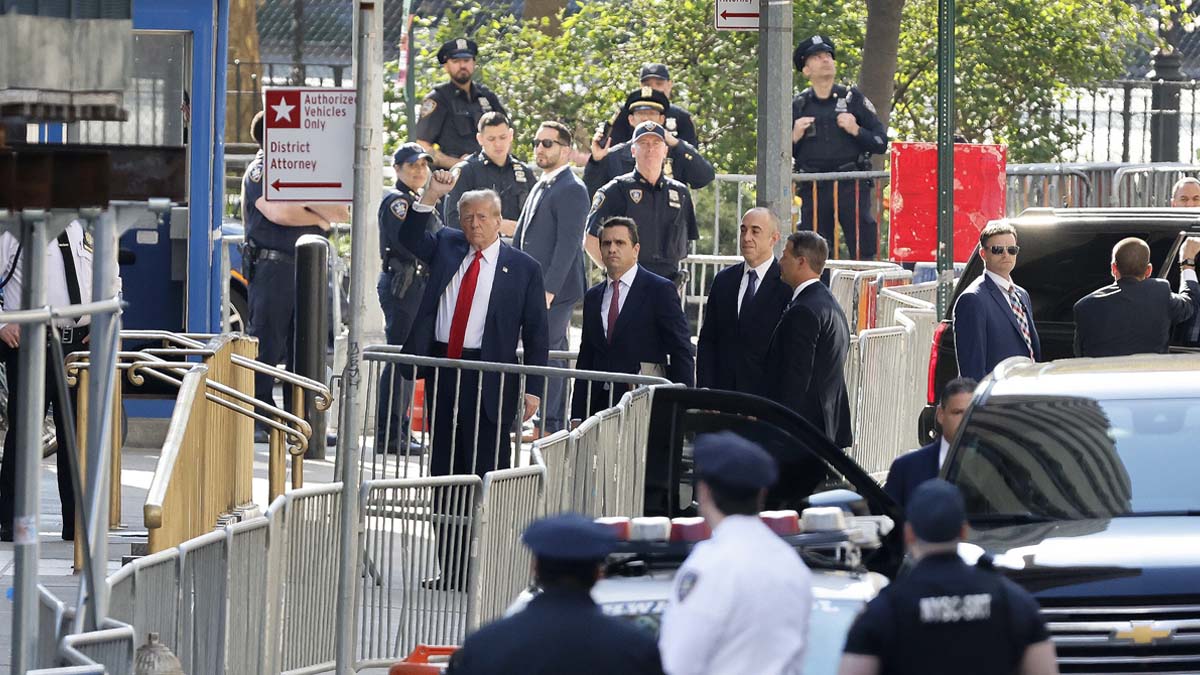
Former President Trump arrived Monday at the Lower Manhattan courthouse for the start of jury selection in his criminal trial.
Trump, who has denied wrongdoing and repeatedly called the trial a political witch hunt, said during brief remarks to reporters as he entered the courtroom that the trial “is an assault on America.”
Justice Juan Merchan declined a request from the defense to recuse himself from the case, per a pool report. He said he would not address the matter further.
Merchan’s interviews with news outlets and a podcast were one of the reasons he was asked to recuse.
Trump moved part of his campaign operation to New York over the weekend, and a massive security operation has descended around the courthouse for what could be two months or so.
Here is what you need to know about the case, key witnesses, and what this means for the presidential hopeful.
What is the hush money case about, and what is Trump accused of?
The hush money case revolves around allegations that Trump paid off several people during the 2016 presidential campaign to silence their claims that he engaged in extramarital sexual encounters.
Trump is alleged to have made these payments through lawyer Michael Cohen. The key evidence is a $130,000 payment made to Daniels, who was ready to go public about a sexual encounter she had with Trump in 2006, a year after he married Melania Trump.
He is also accused of facilitating hush money payments of $150,000 to former Playboy model Karen McDougal over claims of an affair, and $30,000 to a Trump Tower doorman who claimed to have a story about a child Trump had fathered.
While the payments themselves are not illegal, Trump is accused of violating federal campaign finance laws by failing to disclose money that was supposed to be used to boost his electoral chances, instead recording it as a “legal expense”.
Trump now faces 34 felony counts of falsifying business records linked to the payments in this New York state criminal trial.
When is Trump’s trial expected to start and where?
The trial will start at 9:30am EDT (13:00 GMT) on Monday, April 15. The day’s proceedings, which will be held at New York County Criminal Court in New York City, are expected to end at 4:30pm (20:00 GMT).
Who is the judge presiding over the case?
Judge Juan Merchan is presiding over the case. A 12-member jury will decide whether Trump is guilty while Merchan will determine any penalties.
Beginning Monday, the jurors from New York will be shortlisted over at least a week. Potential jurors are randomly selected from voter rolls and other state records and then given a questionnaire. The prosecution and defence each get to disqualify 10 people from the jury pool.
Experts say it may be a challenging process to find jurors who do not already have an opinion on the businessman-turned-politician.
Questions in the list approved by Merchan include whether prospective jurors have attended a rally or campaign event for Trump, whether they follow Trump on social media and whether they have feelings about how he has been treated in the hush money case.
How long is the trial expected to last?
The trial is expected to last six to eight weeks, although this depends upon how open and candid witnesses are.
If Trump takes the witness stand, which he is unlikely to, that would also make the case longer rather than shorter.
Will Trump’s trial be televised?
No, New York state prohibits nearly all audio and visual coverage during trials.
Judges may choose to make an exception, but Judge Merchan has not allowed cameras in his courtroom in the past. At most, photos and videos may be taken before or right after the proceedings.
Trump is expected to be in court on Mondays, Tuesdays, Thursdays and Fridays from 9:30am to 4:30pm.
Who are the key witnesses in the case?
While the prosecutors have not released their official list of witnesses, key expected figures include Daniels, McDougal, and Trump’s former lawyer, Cohen.
Cohen, who pleaded guilty last year and served federal prison time, is now a prosecution witness.
Another key witness expected in the case is David Pecker, who was CEO of American Media, the parent company of the tabloid National Enquirer, up until 2020. He is said to have been Trump’s eyes and ears for any damaging stories in the lead-up to the presidential election.
American Media paid McDougal and the Trump Tower doorman in exchange for exclusive rights to their stories, which gave the company the authority to quash them. American Media escaped any prosecution in return for its cooperation in the campaign finance investigation that led to Cohen’s guilty plea and prison sentence.
What can we expect from the defence?
Trump denies ever having an affair with Daniels and claims the payment was made to protect his family from false allegations, not to sway the election.
The defence may also continue with its strategy from previous trials, which is to paint such cases as politically motivated.
What happens if Trump is convicted?
If convicted, each charge carries a maximum of four years in prison, although just a fine or probation are also possibilities. If there are multiple prison sentences, the judge would decide whether those would run concurrently or consecutively.
Even in the event of prison time, however, there is a customary gap between a conviction and sentencing. Trump’s legal team would almost certainly appeal any decisions around the two, thereby delaying the prospect of him spending time behind bars.
Follow live updates.
This article was updated.
News
Israel: No Choice But to Retaliate Against Iran

Israel’s response to Iran’s weekend missile attack could come as soon as today as the nation’s war cabinet convened to hammer out the timing and scope of the impending counterstrike, according to a report.
On Sunday, Israeli Defense Minister Yoav Gallant warned his US counterpart, Defense Secretary Lloyd Austin, that the Jewish state has “no choice” but to retaliate against the rogue Islamic Republic after it launched hundreds of missiles and suicide drones into Israeli airspace Saturday night, according to Axios correspondent Barak Ravid.
World leaders, including President Biden, have urged Israel to be measured in its response, expressing fears of escalating the conflict even further.
Iran’s aerial assault was in retaliation for an Israeli airstrike in Damascus on April 1 in which a top Iranian general was killed.
Israel — working with a coalition of unlikely allies, including the US, the UK, France, Jordan and Saudi Arabia — was able to stop 99% of the 350 weapons launched by Iran. None of the drones or cruise missiles struck Israel, and only a few of the ballistic missiles made it through, according to the Jerusalem Post.
War cabinet member Benny Gantz has called for a swift response, CNN reports, but Israeli Prime Minister Benjamin Netanyahu has held off on giving the green light as international pressure mounts.
Biden reportedly told Netanyahu that the US will not provide support for a counterattack against Iran.
“You got a win. Take the win,” the president reportedly said.
However, all options remain on the table as the war cabinet debated the nation’s next move, running the gamut from diplomatic to military, including precision strikes against key Iranian oil infrastructure or even a cyberattack campaign, the Wall Street Journal writes.
According to the Washington Post, Netanyahu has requested the Israel Defense Forces (IDF) draw up a battle plan highlighting potential retaliatory strike targets that would “send a message” without causing mass casualties, intended to reduce the risk of the conflict mushrooming out of control.
Leading up to Iran’s attack, Netanyahu faced a growing chorus of concerns from allies about the humanitarian situation in Gaza resulting from Israel’s war against Hamas which began Oct. 7.
Acting too hastily or too aggressively could potentially squander any international goodwill Israel has garnered in the wake of the attack by Iran, which is widely considered a pariah on the global stage.
“This is an opportunity to create a new American-led regional security alignment against Iran, if we can take advantage of it,” former Israel National Security Council chief Chuck Freilich told the outlet.
The debate over how and when to strike back at Iran prompted Israel to delay a long-anticipated military incursion in the southern Gaza city of Rafah, the Times of Israel reported Monday.
News
Meet NPR’s New CEO Katherine Maher
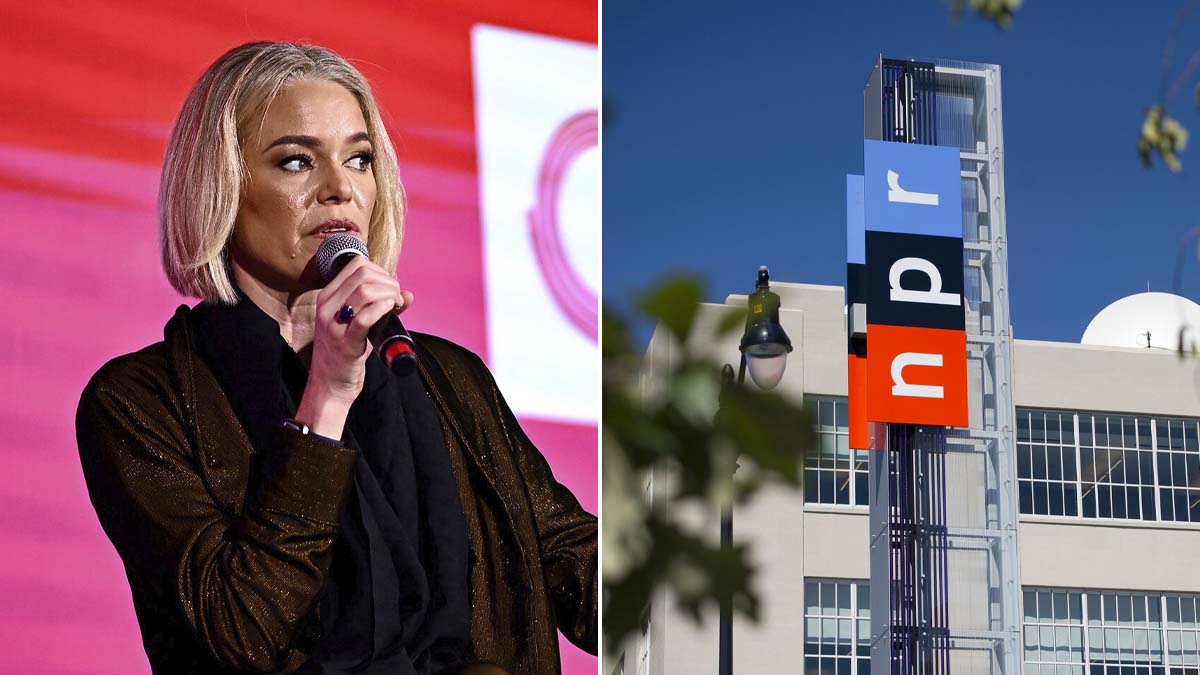
A series of social media posts by NPR CEO Katherine Maher are resurfacing as the organization continues to defend itself against accusations of bias in its reporting.
NPR business desk senior editor Uri Berliner last week wrote a scathing editorial accusing the organization of “telling listeners how to think” through an “absence of viewpoint diversity.” Edith Chaplin, NPR’s chief news executive, addressed the comments in a memo to staff, saying Berliner’s comments only reflect a broadening of priorities in a turbulent media landscape.
CEO Katherine Maher then chimed in Friday with a lengthy memo to staff calling Berliner’s accusations “deeply simplistic” and attributed his complaints to “an audience skewing further away in age from the general population, and significant changes in political affiliations.”
Social media users then began to delve into Maher’s history and are now crying foul over the number of perceived partisan posts previously made by her.
In response to journalist Chris Rufo pointing this out, Elon Musk replied that she’s a “crazy racist!”
Maher also says that “America is addicted to white supremacy,” which is the “real issue.”
New NPR CEO seems to have many symptoms of the Cluster B Longhouse psychopathology. Antagonistic, performative, accusatory, & frankly delusional. Pronouns in bio. Unstable. https://t.co/YioG8rjB9K
— J.D. Haltigan, PhD 🏒👨💻 (@JDHaltigan) April 14, 2024
She also excused looters, and even slammed Hillary Clinton for correctly gendering individuals.
Does not represent 90% of America
— Elon Musk (@elonmusk) April 14, 2024
We fund this shite. pic.twitter.com/3QBJ6U5xv4
— Clifford Asness (@CliffordAsness) April 14, 2024
New NPR CEO furious that white men fly business class https://t.co/DiKgnV1sfc
— Christopher F. Rufo ⚔️ (@realchrisrufo) April 15, 2024
Maher, who stepped into the role of CEO in March, has never held a position in journalism prior to her gig at NPR, according to her LinkedIn profile. She also lists being a member of the Biden administration’s State Department Foreign Affairs Policy Board. Maher attended New York University in 2003 for Middle Eastern and Islamic Studies and is certified in “leadership for racial equity” by the University of Virginia, according to her LinkedIn.
NPR was established in 1967 by Congress as a means of creating a nonprofit radio entity with complete control of its programming, according to Middle Tennessee State University. Since then, the organization has faced criticism of being politically biased from both liberals and conservatives.
News
FBI Opens Criminal Investigation Into Baltimore Bridge Collapse

The FBI is conducting a criminal investigation into the deadly collapse of Baltimore’s Francis Scott Key Bridge that is focused on the circumstances leading up to it and whether all federal laws were followed, according to someone familiar with the matter.
The person was not authorized to discuss details of the investigation publicly and spoke on the condition of anonymity to The Associated Press.
The FBI was aboard the cargo ship Dali conducting court-authorized law enforcement activity, the agency said in a statement Monday. It didn’t elaborate and said it wouldn’t comment further on the investigation, which was first reported by The Washington Post.
Meanwhile, Baltimore Mayor Brandon Scott on Monday announced a partnership with two law firms to “launch legal action to hold the wrongdoers responsible” and mitigate harm to city residents.
The massive Dali left Baltimore’s port in the early hours of March 26, laden with cargo and headed for Sri Lanka, when it struck one of the bridge’s supporting columns, causing the span to collapse into the Patapsco River and sending six members of a roadwork crew plunging to their deaths.
Divers have recovered three of the six bodies from the wreckage.
National Transportation Safety Board Chair Jennifer Homendy said last week that investigators were focusing on the ship’s electrical power system. The ship experienced power issues moments before the crash, as is evident in videos that show its lights going out and coming back on.
Homendy said information gleaned from the vessel’s voyage data recorder is relatively basic, “so that information in the engine room will help us tremendously.”
In his statement announcing the partnership with law firms, Scott said the city “will take decisive action to hold responsible all entities accountable for the Key Bridge tragedy, including the owner, charterer, manager/operator, and the manufacturer of the M/V Dali, as well as any other potentially liable third parties.”
He said with the ship’s owner already seeking to limit the company’s liability, the city needs to act quickly to protect its own interests.
The investigation comes amid concerns about the safety of thousands of U.S. bridges and days after more than two dozen river barges broke loose and struck a closed span in Pittsburgh.
News
The Supreme Court May Throw Out Hundreds of Jan. 6 Convictions
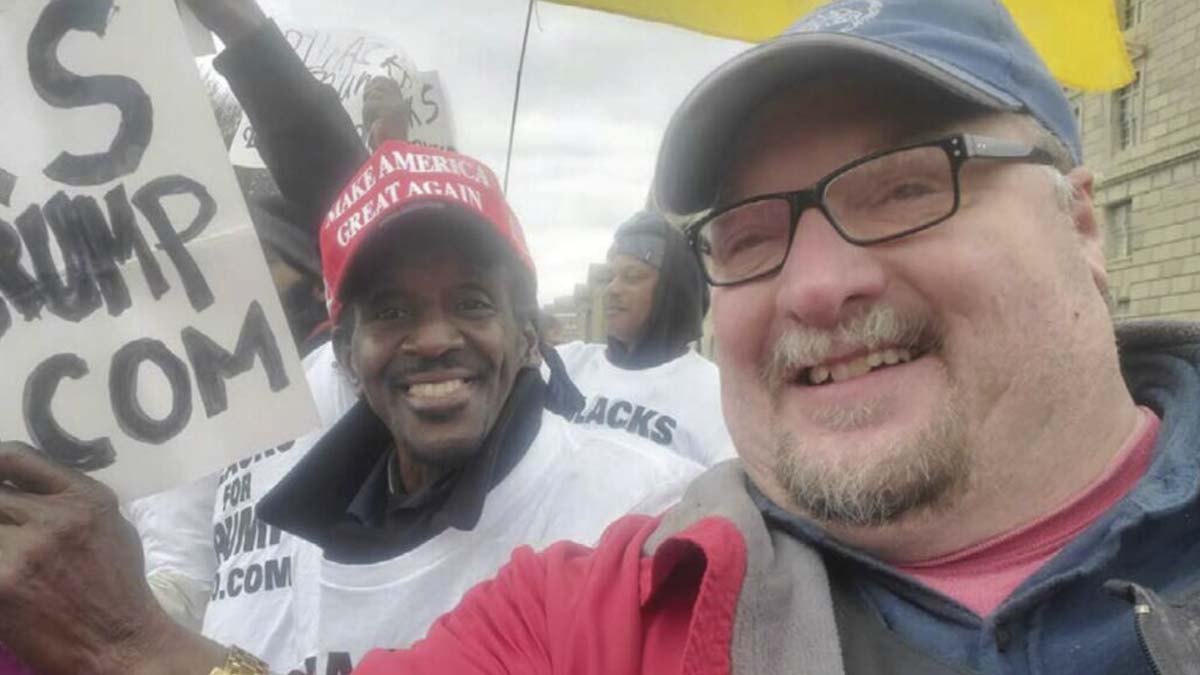
More than 1,265 defendants have been charged by the Department of Justice under President Joe Biden in relation to the Jan. 6 riot at the Capitol. Hundreds of them may have been wrongly charged with a felony.
The Supreme Court is preparing to weigh oral arguments on Tuesday in Fischer v. United States, a dispute that could drastically alter the indictments against possibly hundreds of defendants, including former President Donald Trump. The namesake of the case is Joseph Fischer, a former Pennsylvania police officer who was charged for his alleged participation in violence on the day of the riot.
Fischer was arrested on Feb. 19, 2021, and charged with assaulting a police officer, disorderly conduct within the Capitol, and obstruction of a congressional proceeding, a violation of 18 U.S.C. § 1512(c)(2), which carries a maximum of 20 years in prison and makes it a crime to “otherwise obstruct[], influence[], or impede[] any official proceeding.” The Justice Department used the obstruction of an official proceeding charge in hundreds of other cases, but Fischer’s lawyers will argue to the Supreme Court this week that the statute has no relevance to the riot.
Prosecutors say Fischer sent text messages before the Jan. 6 riot, including a text that said his former police chief may need “to post my bail” because the protest “might get violent.” At one point amid the riot, the former officer called on those around him to “hold the line” as he was part of a crowd that pushed against U.S. Capitol Police officers, according to his criminal affidavit.
The former police officer, who contends he was only inside the Capitol for a few minutes after he was pushed into the police line by the crowd, is asking the justices to throw out the obstruction charge but not the two other charges he faces. The core of his argument is that the law was only intended to apply to evidence tampering and that applying it to protesters who went into the Capitol was an unfair interpretation of the statute.
More than 300 other defendants from that day of protest and rioting have been charged with violating the obstruction law, which was enacted in 2002 as part of the Sarbanes-Oxley Act in the wake of the Enron scandal. The provision was intended to punish the destruction of documents in the scandal surrounding Enron after auditor Arthur Andersen was accused of destroying possibly incriminating records. The federal law is also at the center of two chargea brought in special counsel Jack Smith’s 2020 election subversion indictment against Trump, for which the justices will hear argument on April 25 regarding Trump’s claims of presidential immunity.
The eventual rulings in both Supreme Court cases, expected by the end of June, will shape the future for hundreds of Jan. 6 defendants as well as Trump’s federal criminal cases.
Back in February, the group America First Legal filed a brief at the Supreme Court on behalf of Sen. Tom Cotton (R-AR), Rep. Jim Jordan (R-OH), and 21 other members of Congress in support of Fischer, saying the defendant was subjected to a “weaponized criminal prosecution” while accusing the Biden administration of a double standard when the DOJ handed down no indictment against Rep. Jamaal Bowman (D-NY), who was caught on video pulling a fire alarm on Sept. 30 during a vote on the House floor.
Frederick Ulrich, a federal public defender who represented Fischer after the government appealed the lower court decision to toss the obstruction charge, told the Washington Examiner he was convinced the Supreme Court would seek to reexamine the breadth of the obstruction statute after a federal appeals court issued a “fractured” decision on his client’s case.
“Because it affected so many of these prosecutions and because the application of the statute in that context was unusual and unprecedented, we thought it had a shot of being [granted for review] regardless of the fact that later on, the Justice Department charged a former president with similar offenses,” Ulrich said.
Here is what you need to know as the justices prepare to hear the case.
How did this case arrive before the Supreme Court?
U.S. District Judge Carl Nichols, an appointee of Trump, dismissed the obstruction charge against Fischer on March 15, 2022. Nichols found that the previous subsection, § 1512(c)(1), which prohibits tampering with evidence “with the intent to impair the object’s integrity or availability for use in an official proceeding,” limits § 1512(c)(2) to cases involving evidence tampering that obstructs an official proceeding.
The government appealed to the U.S. Court of Appeals for the District of Columbia Circuit. The appeals court reversed the decision in an opinion by a three-judge panel written by Judge Florence Pan, an appointee of President Joe Biden who succeeded Justice Ketanji Brown Jackson after she was elevated to the Supreme Court by Biden.
Pan agreed with the defendant’s viewpoint that “outside of the January 6 cases brought in this jurisdiction, there is no precedent for using” § 1512(c)(2) “to prosecute the type of conduct at issue in this case.” But she clarified that the meaning of the statute is “unambiguous,” stating that it clearly “applies to all forms of corrupt obstruction of an official proceeding.”
Pan contended that Supreme Court precedent states that even if a statute can be applied in situations not clearly anticipated by Congress, it does not demonstrate ambiguity but rather “demonstrates breadth.”
Judge Gregory Katsas, a Trump appointee on the panel with Pan, argued in a dissent to Pan’s majority decision that the DOJ’s interpretation of the law was likely “improbably broad and unconstitutional in many of its applications.”
After losing at the District of Columbia Circuit, Fischer appealed to the highest court, and the justices agreed to hear the case.
How will justices rule in the case of Fischer?
Ulrich said the Supreme Court’s options for deciding the Fischer case are based on the range of divergent viewpoints that have been expressed by judges so far in lower court proceedings.
“It could adopt Judge Nichols’s very narrow view of the statute, which confined it pretty much to document destruction or something akin to it, or it could be closer to Judge Katsas’s view that it reaches beyond documents … like involving testimony … or they could adopt Pan’s view that it reaches anything from an official proceeding,” Ulrich said.
Bill Shipley, a defense attorney who has represented more than 50 clients involved in the Jan. 6 protest, told the Washington Examiner he believes the justices’ agreement to consider the breadth of the obstruction statute may signal their belief that the DOJ has gone overboard by using it against defendants.
“There was no reason for the court to take this case if it thought that the outcomes were appropriate. It generally only takes criminal cases for the purposes of reversal,” Shipley said.
The Supreme Court’s prior case examining the Sarbanes-Oxley Act also supports the idea of a more limited application of the obstruction statute, according to Fischer. He contends that the listing of specific acts of tampering in the language of § 1512(c)(1) — altering, destroying, mutilating, or concealing — limits the scope of § 1512(c)(2) on obstruction because the use of the word “otherwise” in § 1512(c)(2) suggests the acts that fall under the second subsection of the law must be related to those in the first.
Shipley explained the dichotomy the justices will be analyzing: Does “otherwise” mean “other actions of the same type of kind, or does [it] mean anything that corruptly” impedes an official proceeding?
Justice Department Solicitor General Elizabeth Prelogar contends that § 1512(c)(2) is not limited to conduct involving the availability of evidence but is instead a “catchall offense designed to ensure complete coverage of all forms of corrupt obstruction of an official proceeding,” according to a brief filed at the high court.
In Prelogar’s understanding of the obstruction statute, words such as “impede” or “obstruct” are intentionally broad terms that can cover a wide range of conduct that hinders official proceedings.
And while the DOJ has acknowledged that § 1512(c) was enacted in direct response to the Enron scandal, it contends Congress created § 1512(c)(1) to preclude legal gaps exposed by the scandal and further argues that § 1512(c)(2) was written to address the risk that “corrupt obstruction could occur in unanticipated ways not prohibited by statutes targeted at specific forms of obstruction.”
What are the implications for Trump and other defendants?
More than 327 defendants have been charged with violating the obstruction statute, and more than 50 have pleaded guilty to the count, according to a Washington Examiner review of court records.
Trump has been charged with two counts under the same law, conspiracy to obstruct an official proceeding and obstruction of an official proceeding, in Smith’s 2020 election subversion case. He has pleaded not guilty to both of these counts, along with two others that arose from his actions in the weeks following the 2020 election.
Ulrich said he believes that if the justices find the obstruction law was overly broad as applied to Fischer, the court will likely remand the case back to the trial court with an accompanying opinion outlining the breadth of § 1512(c)(2).
Notably, the federal public defender said he thinks the more than 50 defendants who have already pleaded guilty to the obstruction count could be “out of luck.”
“Not unless they pled conditionally,” Ulrich said of whether those defendants could benefit from the Supreme Court’s decision.
For defendants who have already been “tried, convicted and sentenced or pled and did not raise this issue,” Ulrich said they may find it difficult to have their sentences retroactively altered. But he noted for defendants who do have guilty pleas on the record, there is a so-called collateral challenge mechanism they could use if the high court narrows the breadth of § 1512(c)(2).
Meanwhile, Smith has sought to pour cold water on the notion that Trump could shake off two charges against him in his Washington, D.C., federal criminal case, one of two indictments the special counsel has levied against him as he fights two other state-level indictments amid the 2024 presidential campaign.
In his latest Supreme Court filing arguing against Trump’s claim that he can avoid a trial entirely by invoking “presidential immunity,” Smith argued that even if the justices narrowed the breadth of the obstruction statute in Fischer, the statute as applied to Trump would remain “valid.”
“Whether the Court interprets [that provision] consistently with a natural reading of its text or adopts the evidence-impairment gloss urged by the petitioner in Fischer, the Section 1512 charges in this case are valid,” Smith wrote.
Even if Trump managed to shake off two charges he faces in the indictment, he would still be on the hook for the other two charges, including conspiracy to defraud the United States and conspiracy against rights to have votes properly counted.
Trump more broadly has sought to delay his federal criminal trials at every turn, as he could call on the DOJ to end its prosecution of him if he defeats Biden in the election. Trump has pleaded not guilty to all 88 felony counts he faces across four separate indictments.
Nearly one week after the arguments in the Fischer case, the nine justices will reconvene on April 25 to weigh whether Trump enjoys broad immunity that shields him from Smith’s indictment, another case that will determine the potency of Smith’s case against the former president.
News
Tesla Lays Off More Than 10% of Workforce: Read the Elon Musk Memo

Tesla will lay off more than 10% of its global workforce, according to a memo sent to employees by CEO Elon Musk.
The company’s shares were down 3% on Monday morning.
“As we prepare the company for our next phase of growth, it is extremely important to look at every aspect of the company for cost reductions and increasing productivity,” Musk said in the memo obtained by CNBC.
“As part of this effort, we have done a thorough review of the organization and made the difficult decision to reduce our headcount by more than 10% globally,” the memo said.
The memo was first reported by Electrek.
Tesla had 140,473 employees as of December 2023.
Tesla shares have taken a bruising in recent months, falling 31% year to date. While electric vehicle sales are still gaining popularity worldwide, their sales growth rate has slowed especially for Tesla. The company now faces more competition than ever.
To end 2023, China’s BYD temporarily dethroned Tesla as the world’s top EV maker. Chinese smartphone company Xiaomi in March said it would sell its first electric car for far less than Tesla’s Model 3.
Musk has previously recognized that China, home to a large Tesla factory, may also house the company’s strongest competition. “There’s a lot of people who are out there who think that the top 10 car companies are going to be Tesla followed by nine Chinese car companies. I think they might not be wrong,” Musk said in November.
Some would-be Tesla customers are now skipping the brand owing to Musk’s incendiary rhetoric
Earlier this month, Tesla reported its first annual decline in vehicle deliveries since 2020, when the Covid-19 pandemic disrupted production extraneous of demand — first-quarter deliveries fell by 8.5% on the year to 386,810 in the first quarter, with output down 1.7% from a year earlier and 12.5% sequentially despite discounts and incentives offered to customers throughout the quarter.
More recently, Tesla trimmed the subscription price of its premium driver assistance system, marketed as its Full Self-Driving or FSD option, for U.S. customers. The move was sharply at odds with Musk’s previous pledges that the FSD fee would only bulk up as Tesla added features and functionality to the system. Despite the brand name, the system does not make Tesla vehicles self-driving and requires a driver attentive to the road, ready to steer or brake at any time.
But the squeeze on the company’s operating margin — which came in at 8.2% in the fourth quarter, down from 16% a year earlier — remains, and Tesla has warned investors to brace that vehicle volume growth this year “may be notably lower” than the rate logged in 2023, saying it is “currently between two major growth waves.”
Logistical challenges exacerbated Tesla’s problems this year. The company’s component supply was a casualty of disruptions caused by Yemeni Houthi maritime attacks in the Red Sea, while the automaker’s gigafactory near Berlin was forced to briefly suspend production due to suspected arson at a nearby electricity substation.
Tesla is scheduled to report first-quarter financial results on April 23.
Here’s the full memo from Musk (transcribed by CNBC):
Over the years, we have grown rapidly with multiple factories scaling around the globe. With this rapid growth there has been duplication of roles and job functions in certain areas. As we prepare the company for our next phase of growth, it is extremely important to look at every aspect of the company for cost reductions and increasing productivity.
As part of this effort, we have done a thorough review of the organization and made the difficult decision to reduce our headcount by more than 10% globally. There is nothing I hate more, but it must be done. This will enable us to be lean, innovative and hungry for the next growth phase cycle.
I would like to thank everyone who is departing Tesla for their hard work over the years. I’m deeply grateful for your many contributions to our mission and we wish you well in your future opportunities. It is very difficult to say goodbye.
For those remaining, I would like to thank you in advance for the difficult job that remains ahead. We are developing some of the most revolutionary technologies in auto, energy and artificial intelligence. As we prepare the company for the next phase of growth, your resolve will make a huge difference in getting us there.
Thanks,
Elon
News
Gun Supervisor for “Rust” Movie Gets 18 Months in Prison
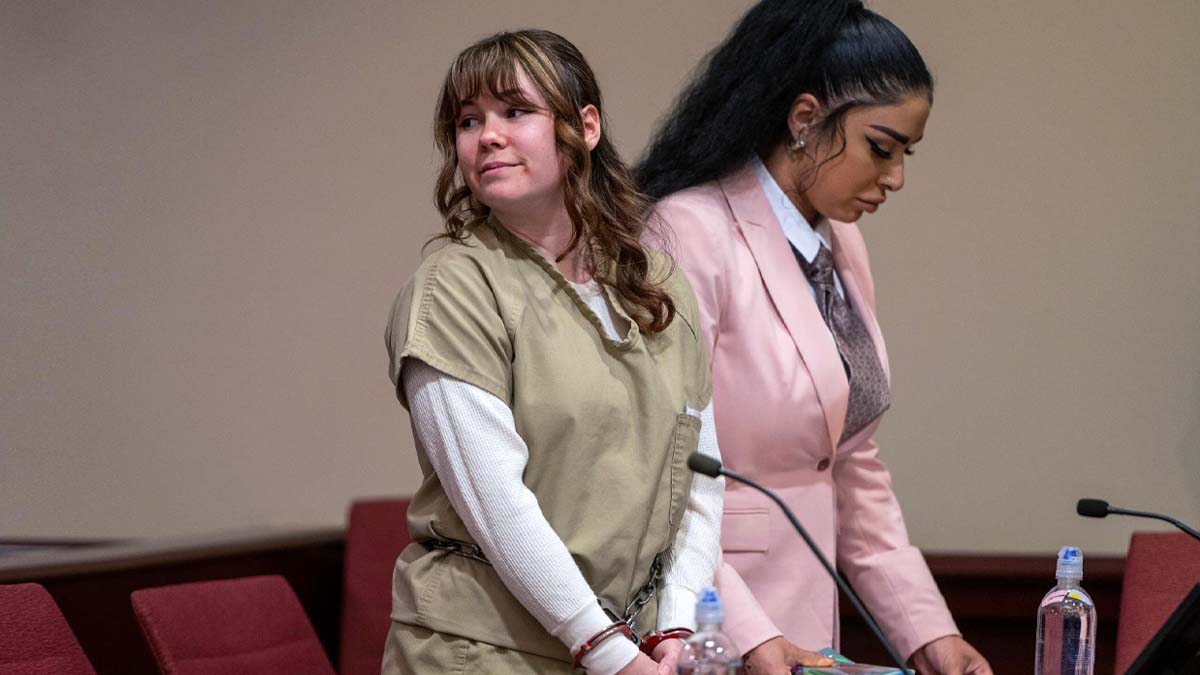
A movie weapons supervisor was sentenced to 18 months in prison in the fatal shooting of a cinematographer by Alec Baldwin on the set of the Western film “Rust,” at a sentencing hearing Monday in a New Mexico state court.
Movie armorer Hannah Gutierrez-Reed was convicted in March by a jury on a charge of involuntary manslaughter in the death of cinematographer Halyna Hutchins and has been held for more than a month at a county jail on the outskirts of Santa Fe.
Baldwin, the lead actor and co-producer for “Rust,” was pointing a gun at Hutchins when the revolver went off, killing Hutchins and wounding director Joel Souza.
Baldwin has pleaded not guilty to a charge of involuntary manslaughter in the shooting death of Halyna Hutchins. He is scheduled for trial in July at a courthouse in Santa Fe.
The sentence against Gutierrez-Reed was delivered by New Mexico Judge Mary Marlowe Summer who is overseeing proceedings against Baldwin.
Prosecutors blamed Gutierrez-Reed for unwittingly bringing live ammunition onto the set of “Rust” where it was expressly prohibited and for failing to follow basic gun safety protocols. After a two-week trial, the jury deliberated for about three hours in reaching its verdict.
Gutierrez-Reed teared up Monday as Hutchins’ agent, Craig Mizrahi, spoke about the cinematographer’s creativity and described her as a rising star in Hollywood. He said it was a chain of events that led to Hutchins’ death and that had the armorer been doing her job, that chain would have been broken.
Friends and family, including Souza, told the court they were seeking justice for what had happened to the cinematographer. They said she was “a bright beam of light,” describing her as courageous, tenacious and compassionate.
Los Angeles-based attorney Gloria Allred read a statement by Hutchins’ mother, Olga Solovey, who said her life had been split in two and that time didn’t heal, rather it only prolonged her pain and suffering. A video of a tearful Solovey, who lives in Ukraine, also was played for the court.
“It’s the hardest thing to lose a child. There’s no words to describe,” Solovey said in her native language.
Defense attorneys for Gutierrez-Reed requested leniency in sentencing — including a possible conditional discharge that would avoid further jail time and leave an adjudication of guilt off her record if certain conditions are met.
Gutierrez-Reed was acquitted at trial of allegations she tampered with evidence in the “Rust” investigation. She also has pleaded not guilty to a separate felony charge that she allegedly carried a gun into a bar in Santa Fe where firearms are prohibited.
Defense attorneys have highlighted Gutierrez-Reed’s relatively young age “and the devastating effect a felony will have on her life going forward.”
They say the 26-year-old will forever be affected negatively by intense publicity associated with her prosecution in parallel with an A-list actor, and has suffered from anxiety, fear and depression as a result.
Special prosecutor Kari Morrissey urged the judge to impose the maximum prison sentence and designate Gutierrez-Reed as a “serious violent offender” to limit her eligibility for a sentence reduction later, describing the defendant’s behavior on the set of “Rust” as exceptionally reckless.
Morrissey told the judge Monday that she reviewed nearly 200 phone calls that Gutierrez-Reed had made from jail over the last month. She said she was hoping there would be a moment when the defendant would take responsibility for what happened or express genuine remorse.
“That moment has never come,” Morrissey said. “Ms. Gutierrez continues to refuse to accept responsibility for her role in the death of Halyna Hutchins.”
“Rust” assistant director and safety coordinator Dave Halls last year pleaded no contest to negligent handling of a firearm and completed a sentence of six months unsupervised probation. “Rust” props master Sarah Zachry, who shared some responsibilities over firearms on the set of “Rust,” signed an agreement with prosecutors to avoid prosecution in return with her cooperation.
Written testimonials in favor of leniency included letters from Gutierrez-Reed’s childhood friend and romantic partner Sean Kridelbaugh, who said Gutierrez-Reed cries constantly out of remorse in the shooting and that further incarceration would interfere with efforts to care for a relative with cancer. Other friends and former colleagues urged the judge to emphasize rehabilitation over punishment in the sentencing.
The pending firearms charge against Gutierrez-Reed stems from an incident at a bar in downtown Santa Fe, days before she was hired to work as the armorer on “Rust.” Prosecutors says investigations into the fatal shooting led to discovery of a selfie video in which Gutierrez-Reed filmed herself carrying a firearm into the bar, while defense attorneys allege vindictive prosecution.
This article was updated.
News
Reuters: Biden Conveyed to Iran That It’s Attack on Israel Had to Be “Within Certain Limits”
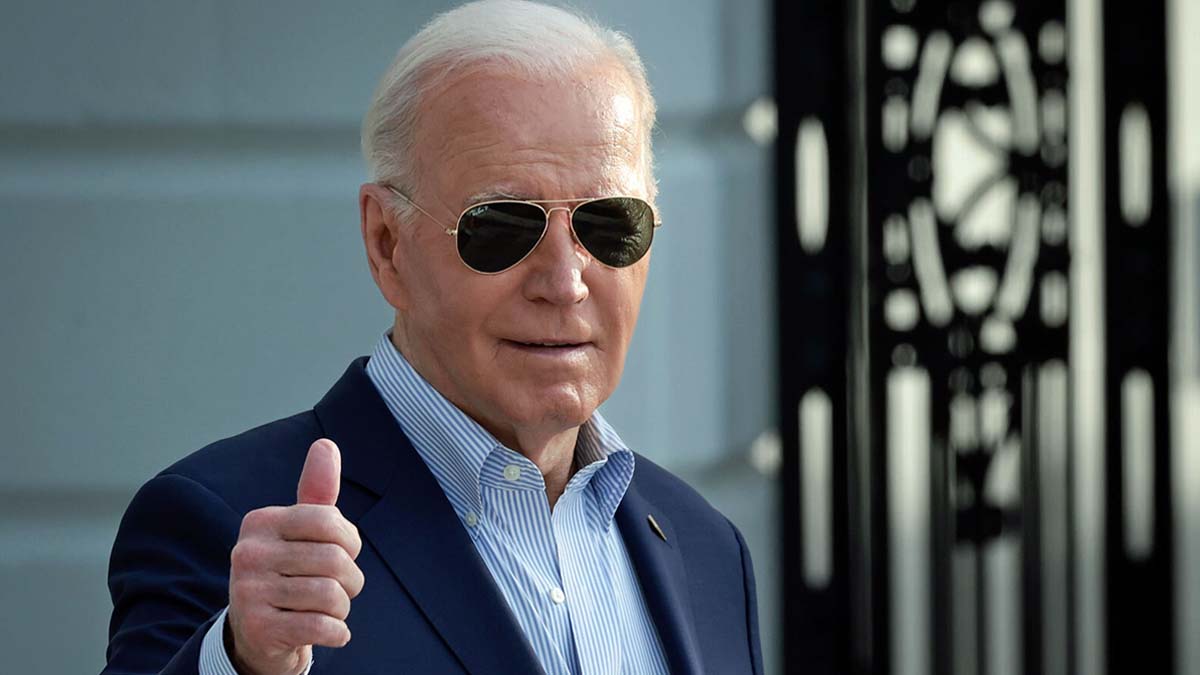
Iran informed Turkey in advance of its planned operation against Israel, a Turkish diplomatic source told Reuters on Sunday, adding that Washington had conveyed to Tehran via Ankara that any action it took had to be “within certain limits.”
Turkey, which has denounced Israel for its campaign on Gaza, said earlier on Sunday that it did not want a further escalation of tensions in the region.
The Turkish source, speaking on condition of anonymity, said Turkish Foreign Minister Hakan Fidan had spoken to both his US and Iranian counterparts in the past week to discuss the planned Iranian operation, adding Ankara had been made aware of possible developments.
Middle East de-escalation efforts
Earlier this week, US Secretary of State Antony Blinken spoke to Fidan to make clear that escalation in the Middle East was not in anyone’s interest.
“Iran informed us in advance of what would happen. Possible developments also came up during the meeting with Blinken, and they (the US) conveyed to Iran through us that this reaction must be within certain limits,” the source said.
“In response, Iran said the reaction would be a response to Israel’s attack on its embassy in Damascus and that it would not go beyond this.”
Iran, which neighbours Turkey, had vowed retaliation for what it called an alleged Israeli strike on its Damascus consulate on April 1 that killed seven officers of the Islamic Revolutionary Guard Corps.
Turkey’s foreign ministry later confirmed the contacts in a statement, saying Ankara had called for restraint and warned of a regional war if tensions escalated further.
It said Ankara would continue efforts to prevent further conflict and escalation in the region.
A Turkish security source said CIA chief William Burns had spoken to Ibrahim Kalin, head of Turkey’s MIT intelligence agency, over the Eid al-Fitr holidays and asked him to act as a “mediator” in the Israel-Iran tensions.
The two discussed ceasefire efforts in Gaza as well, the source said, without elaborating.
News
Police Seize Illegal Handgun from E. Jean Carroll

Police in New York took possession of a gun belonging to writer E. Jean Carroll in February after she said during testimony in her defamation lawsuit against former President Donald Trump that she had an unlicensed firearm at home, according to a police report obtained by NBC News.
The chief of police in Warwick, New York, visited Carroll at her home on Feb. 15 “to discuss some open issues,” the report states, including Carroll’s disclosure of the handgun while she was on the witness stand Jan. 17.
During the second day of the civil trial, Carroll had told the federal court in lower Manhattan that she kept a “high standard revolver, nine chambers” at home with ammunition. “By my bed,” she said.
“I still do not have a license,” Carroll added.
John Rader, the reporting officer, said in his report that he “offered to secure the weapon at the police station’s property for safekeeping.”
Carroll and a member of her security team surrendered the gun a day after Rader visited, and the firearm was being held until Carroll receives a New York pistol license, the report said.
Under New York state law, a person can be found guilty of criminal possession if they possess a firearm, such as a pistol, that has not been registered. The felony carries a maximum sentence of four years.
It was unclear why police waited almost a month to inquire in person about the unregistered gun Carroll said she had at her house or whether police are still in possession of it.
Carroll’s gun became a contentious topic under cross-examination in the January hearing, as Trump attorney Alina Habba pressed Carroll on her gun ownership and whether she knew she needed a license for it.
The judge presiding over the case, U.S. District Judge Lewis Kaplan, appeared outwardly frustrated over the line of questioning by Habba.
“Don’t even start,” told her when she began asking Carroll about the firearm.
The jury ordered Trump to pay Carroll $83.3 million in damages for repeatedly defaming her. The award included $11 million for damage to Carroll’s reputation, $7.3 million for emotional harm and other damages, and $65 million in punitive damages.
Kaplan later rejected arguments by Trump’s attorneys that the case should be thrown out because Carroll deleted threatening messages, including death threats. The judge said that while Carroll admitted she deleted some of the purported death threats, the details of the deletions remain unclear.
Trump had already been found liable for defaming Carroll while he was in the White House, with the jury tasked only with determining how much she should receive in damages.
Trump has denied the rape and defamation claims against him, and posted a $91.6 million bond to secure the judgment while he appeals the verdict.
News
Trans High School Runner Finishes 2nd Among Girls, Would Have Finished Near the Bottom of Boys Division

An Oregon high school came under fire on Saturday as a transgender athlete was able to compete against girls at a meet.
Aayden Gallagher, a 10th-grader at McDaniel High School, competed in the Sherwood Need For Speed Classic in Sherwood, Oregon.
Gallagher was seen in one clip blowing away the competition in a heat for the 200-meter.
Gallagher clocked in with a 25.49 mark and ended up finishing in second place in that event as well as the 400 meter and in seventh place in the 4×100 replay and eighth place in the 4×400 relay.
But Gallagher’s ability to compete in the event sparked outrage on social media.
“Championing boys in girls sports is blatant misogyny,” the Independent Council on Women’s Sports (ICONS) wrote on X.
Gallagher clocked in with a 25.49 mark and ended up finishing in second place in that event as well as the 400 meter and in seventh place in the 4×100 replay and eighth place in the 4×400 relay.
But Gallagher’s ability to compete in the event sparked outrage on social media.
“Championing boys in girls sports is blatant misogyny,” the Independent Council on Women’s Sports (ICONS) wrote on X.
Watch:
Championing boys in girls sports is blatant misogyny.
— ICONS (@icons_women) April 14, 2024
Aayden Gallagher, a boy who
“identifies” as a girl, set a new record after easily defeating his female competitors.🤣🤣🤣🤣 pic.twitter.com/aEy9jaDKzb— Anticommie (@QueenAnticommie) April 14, 2024
“Abuse of girls…by the gov’t,” Judicial Watch’s Tom Fitton wrote.
“Another proud moment for ‘women’s’ sports!” OutKick founder Claty Travis wrote.
Libs of TikTok added: “These high school girls just had their dream stolen from them because the school is catering the delusions of a boy who pretends to be a girl. . . . He is a cheater.”
The Oregon School Activities Association (OSAA) has a policy for transgender participation in high school sports.
“The OSAA endeavors to allow students to participate for the athletic or activity program of their consistently asserted gender identity while providing a fair and safe environment for all students,” the policy stated.
“As with Rule 8.2 regarding Duration of Eligibility / Graduation, rules such as this one promote harmony and fair competition among member schools by maintaining equality of eligibility and increase the number of students who will have an opportunity to participate in interscholastic activities.”
Additionally, the OSAA rules state that “once a transgender student has notified the student’s school of their gender identity, the student shall be consistently treated as that gender for purposes of eligibility for athletics and activities, provided that if the student has tried out or participated in an activity, the student may not participate during that same season on a team of the other gender.”
News
John Bolton: Israel Should Annihilate the Iranian Nuclear Program
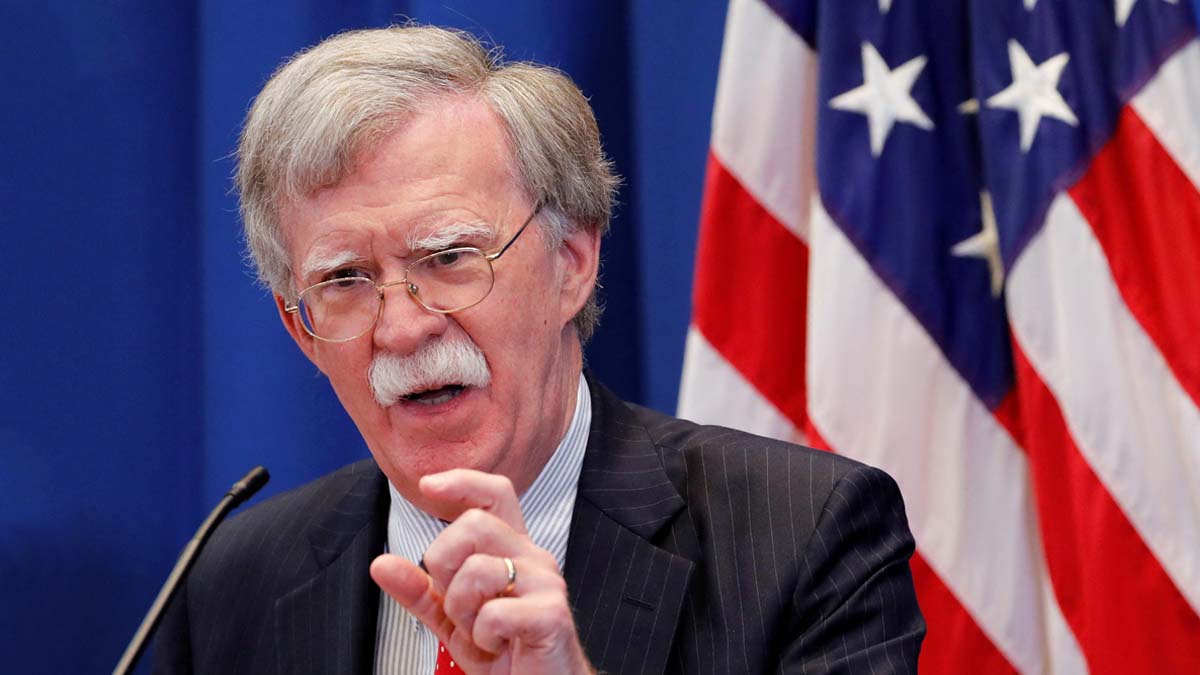
In a candid Sunday interview with CNN, former US National Security Advisor John Bolton expressed strong views on how Israel should respond to Iran’s threats.
He urged Israel to consider the current geopolitical tension as a crucial moment to target and dismantle Iran’s nuclear capabilities.
“I think Israel has a wide range of potential targets starting by flattening Iran’s air defense capabilities,” Bolton asserted, emphasizing the existential threat posed by Iran’s nuclear ambitions to Israel’s national security.
Bolton articulated that the primary focus for Israel should be crippling Iran’s nuclear weapons program.
“Most importantly, I think Israel should be looking at this as an opportunity to destroy Iran’s nuclear weapons program, which is the existential threat that Israel faces,” he explained.
The former advisor’s stance sheds light on the increasing skepticism about the effectiveness of ongoing diplomatic negotiations with Iran.
Bolton’s call for a decisive military strategy highlights a critical division in international policy circles regarding the best approach to ensure stability and security in the Middle East.
Opportunity in light of Iranian retaliation
Iran launched a significant missile and drone attack against Israel on Sunday, with hundreds of drones and missiles reportedly originating from Iran and other regional sources.
Despite the extensive attack, the Iron Dome and other Israeli defense systems effectively intercepted most threats, with limited damage reported. A young girl was seriously injured in one of the attacks, underscoring the human impact amidst the strategic defenses.
John Bolton, an American attorney and diplomat, served as the United States Ambassador to the United Nations from 2005 to 2006 and as National Security Advisor from 2018 to 2019 under President Donald Trump, advocating strongly against the Iran nuclear deal.
Known for his hawkish foreign policy views, Bolton has supported military action and regime change in several countries and has held various significant roles in the US government, including positions under Ronald Reagan, George W. Bush, and as a commentator for Fox News.
-


Sydney Rocked by Second Stabbing in Days as Priest and Worshippers Targeted at Church
10 hours ago • 2 min read • 39 Comments -


The Supreme Court May Throw Out Hundreds of Jan. 6 Convictions
10 hours ago • 7 min read • 12 Comments -


Meet NPR’s New CEO Katherine Maher
10 hours ago • 2 min read • 23 Comments -
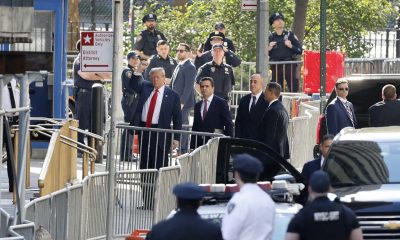

Trump Criminal Trial Begins: Everything You Need to Know
10 hours ago • 4 min read • 20 Comments



STAGED
Arrest this MONSTER for Crimes Against Humanity
NUREMBERG HIS ASS!
Stagged for him to look decent!!!!!
I certainly hope, this poor woman didn’t allow this killer to get anywhere near her with a hypodermic needle.
ANOTHER STUNT TO GAIN HIM FAVOR,HE NEEDS IT RIGHT NOW,